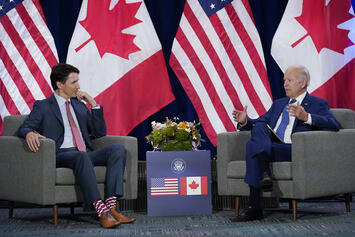
U.S. President Joe Biden, in one of his regularly inept utterances, recently castigated Japan and other East Asian countries for being “xenophobic,” compared to the relatively immigrant-friendly United States. The president surely made no friends, but actually spoke something of the truth, or perhaps more of a half-truth.
As Biden suggests, western immigration receiving countries like the U.S., Australia, Canada and the United Kingdom have long benefited from mass migration. Canada, for example, ranks eighth among receiving countries, but has a considerably higher percentage of foreign born citizens than its much more populous neighbour.
With the lowest fertility rate in history, without immigration, Canada would now be facing the kind of population decline now looming in much of East Asia, notably China. Statistics Canada has recently indicated that immigration accounts for up to 97.7 per cent of Canada’s population growth.
This shift relies on the pool of migrants predominately from developing countries that is projected to average 2.2 million a year globally through 2050. To some, as the Brookings Institute suggests, the West’s “last hope” to forestall demographic and economic decline lies in mass migration from African countries.
Certainly, population decline is not good for economies. Japan’s long economic slowdown has occurred with a labour force that has been declining since the 1990s and will be fully a third smaller by 2035. In China, where hospital delivery rooms are closing in many hospitals, the working-age population (those between 15 and 64 years old) peaked in 2011 and is projected to drop 23 per cent by 2050 when almost half of China’s population will be over 60, a percentage far greater than in the U.S. or much of Europe.
Driven by ultra-low fertility rates, the labour situation is particularly acute in Japan, China, Korea, Taiwan and Singapore. Outside China, these countries no longer out-perform the United States, although they still grow faster, for the most part, than both Canada and the United Kingdom.
For western countries, including Canada, a shrinking workforce creates an unsustainable future for the younger generations. For the OECD as a whole, the dependence ratio of older people (i.e., the ratio of those aged 65 to those aged 20-64) will rise from the current figure of 22 per cent, to 46 per cent in 2050. The United States already faces a massive public pension crisis, which is expected to get much worse by 2035.
Yet, if mass immigration creates opportunities, often overlooked are the broader, and more complex, economic, social, and political ramifications. Contrary to President Biden’s assertions — backed by reliable party organs like the Washington Post — more immigration does not automatically make a country more economically productive, but could simply expand the economy to meet the need of a growing population.
Read the rest of this piece at National Post.
Joel Kotkin is the author of The Coming of Neo-Feudalism: A Warning to the Global Middle Class. He is the Roger Hobbs Presidential Fellow in Urban Futures at Chapman University and and directs the Center for Demographics and Policy there. Learn more at joelkotkin.com and follow him on Twitter @joelkotkin.
Photo: Taylor Atkinson via Flickr in Public Domain.












